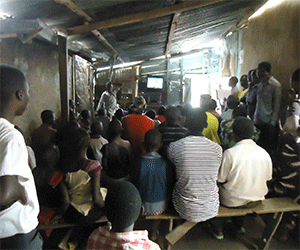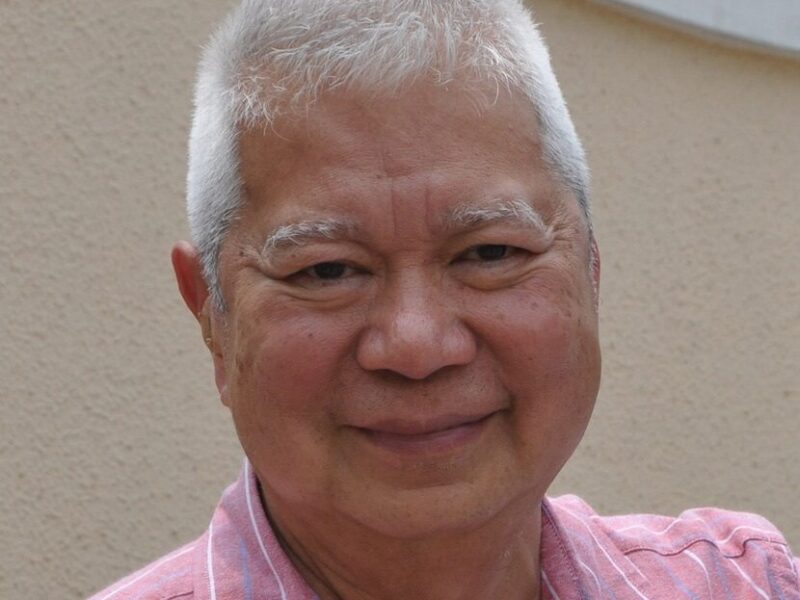In Tanzania, when I think about CCP, I think about the Fataki campaign, Wahapahapa radio drama and malaria initiatives. I don’t think about training for screenwriters and filmmakers,” says Abdu Simba, a Tanzanian script consultant. “But now that’s changed.”
This sentiment expressed by Mr. Simba is one that is likely held by many; after all, the Johns Hopkins Bloomberg School of Public Health Center for Communication Programs (CCP) is known for its efforts to use strategic communication to improve health worldwide. However, it was precisely the filmmaking industry in Tanzania that was targeted by Swahiliwood Filmmaking for Change, an initiative created by CCP’s Tanzania Capacity and Communication Project (TCCP), a five-year, USAID-funded project, under the leadership of its production partner, Media for Development International (MFDI).
“The Swahili film industry is growing,” explains Louise Kamin, Program Officer at MFDI. “Every week, ten new low budget movies are produced, and six are released into the market, a market consisting of 132 million potential viewers spread across East Africa and reaching into Central and Southern Africa.”
Despite its size and potential for impact, this growing industry has yet to receive formal training or direction.
“We launched the Swahiliwood project because we felt that the young film industry in Tanzania represented untapped potential,” explains John Riber, Director of MFDI. “Film has long been used as a means to convey social and behavior change messages. But no one is working with Tanzanian filmmakers and distributors to make films with social messages that speak directly to local audiences.”
A leader in the field of “entertainment education,” CCP’s experience dates back over two decades. During this time, CCP has assisted in the production of films, television shows and radio programs across Africa, Asia, the Near East and the Americas. Many of the CCP-produced programs have garnered critical acclaim and have fostered changes in health behaviors, for example, the well-regarded television shows from South Africa, including Tsha Tsha, 4play: sex tips for girls and Intersexions that focus on HIV prevention.
Building on this wealth of experience, MFDI through TCCP launched the Swahiliwood initiative to develop and produce SBCC films in collaboration with Tanzanian filmmakers and distributors. The initiative represents a unique approach to filmmaking; TCCP will work with filmmakers to produce three feature films. These three films are being selected through a competitive training and mentoring process with local and international film professionals.
Twenty-five scriptwriters participated in the first workshop in November 2011. Participants learned the fundamentals of writing entertainment education stories with behavior change goals, and were introduced to TCCP’s communication objectives for the films: reducing risk of HIV infection by reducing concurrent sexual partnerships, and increasing adherence to HIV treatment.
In January, six script concepts were selected for further development. The scriptwriters participated in further mentoring to refine the concepts and develop them into treatments and scripts, of which three will be selected for production as feature films. The six month production process, too, will involve significant training and mentoring in all phases from pre-production through post-production.
By structuring the Swahiliwood Filmmaking for Change initiative in this manner, TCCP has been able to train a much larger group of local filmmakers in entertainment education concepts and script development.
Not only is TCCP aiding filmmakers with production, it will also assist with distribution. Already plans are in the works to enhance exposure for the three feature films using commercial DVD distributors, TCCP and partner organization community outreach efforts, and broadcasting the films on national television stations.
“Through this initiative, TCCP has given filmmakers in Tanzania an unprecedented opportunity to strengthen our script creation and production skills and bring deeper meaning and the potential for greater social impact to our work,” concludes Abdu Simba.
And CCP can add filmmaker training to its list of innovative capacity building activities in Tanzania.
Watch a short documentary assessing the state of the film industry in Tanzania.
View photos of the Tanzanian film industry and the Swahiliwood Filmmaking for Change workshops.
//





